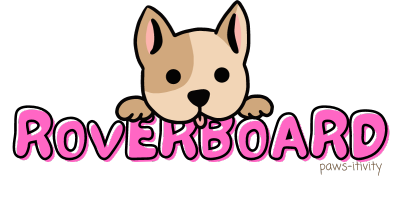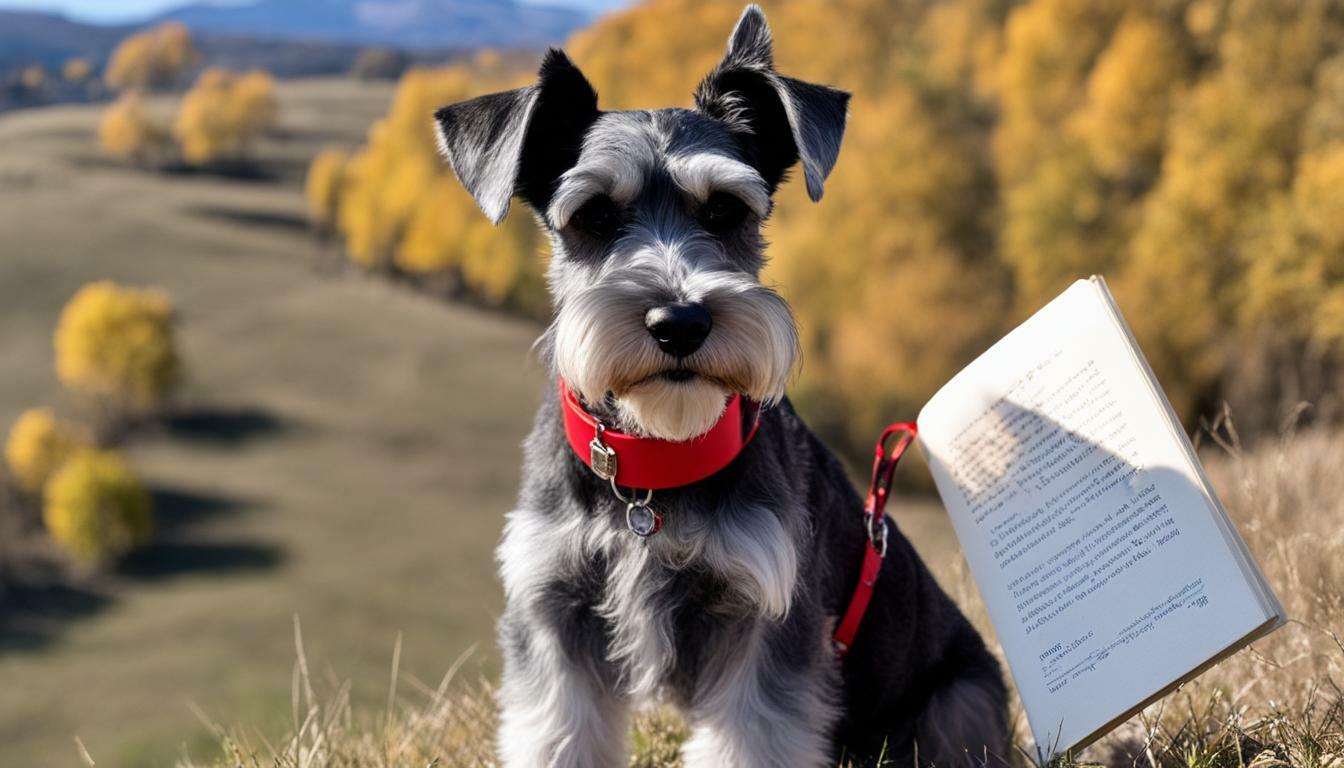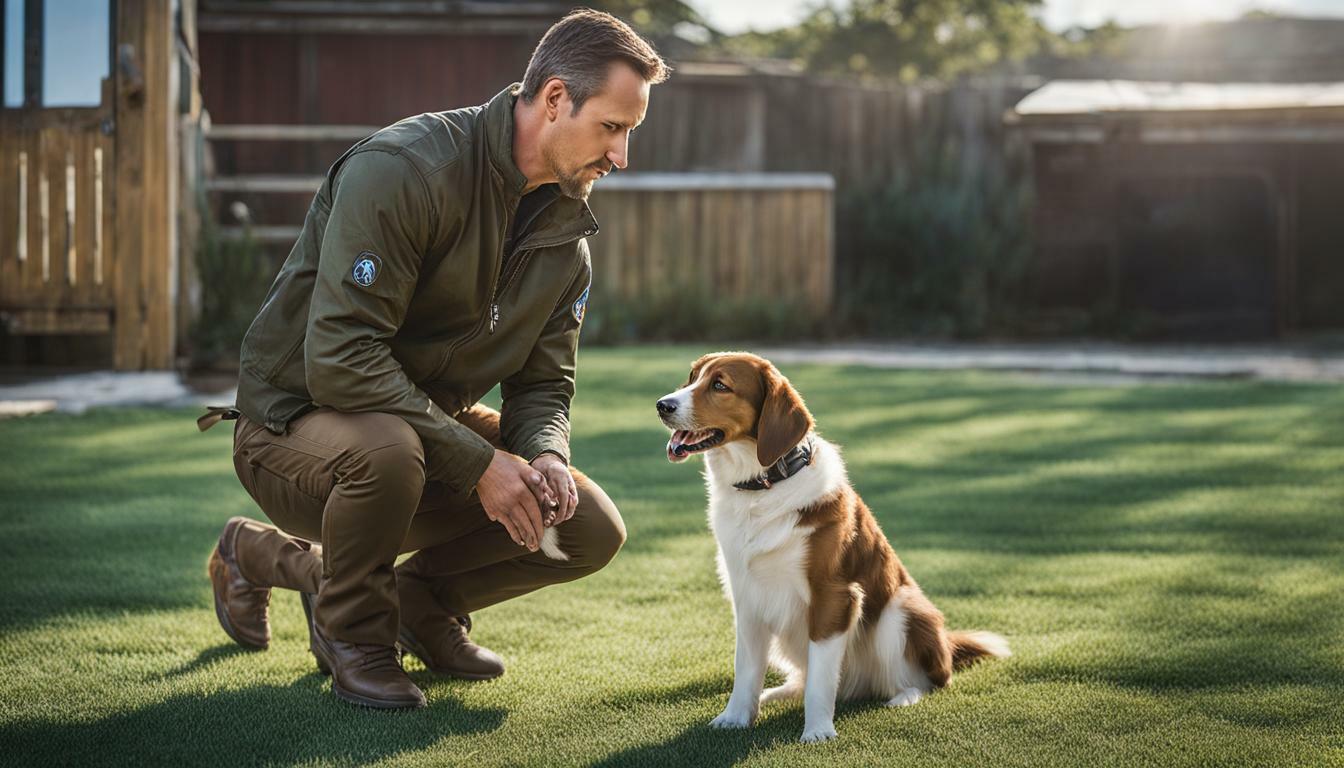Welcome to our comprehensive guide on Miniature Schnauzer ownership. Miniature Schnauzers are a popular breed of small dogs known for their distinctive appearance and friendly personalities. These lovable dogs make great companions, but it’s important to be a responsible and knowledgeable owner to ensure their happiness and health.
In this guide, we will cover all the essential information you need to know before bringing a Miniature Schnauzer into your family. From care and training to health and diet, we’ve got you covered.
Key Takeaways:
- Being a responsible and knowledgeable owner is crucial for the well-being of a Miniature Schnauzer.
- This comprehensive guide covers everything you need to know about Miniature Schnauzer ownership.
- Topics include care, training, health, grooming, breeder selection, feeding, exercise, behavior correction, and socialization.
Miniature Schnauzer Care Tips
If you are considering bringing home a Miniature Schnauzer or have already welcomed one into your family, it’s essential to provide proper care for their overall health and well-being. In this section, we will discuss some Miniature Schnauzer care tips to help you keep your pet happy and healthy.
Regular Grooming
Grooming is an essential part of caring for your Miniature Schnauzer. Regular grooming keeps their coat clean and healthy while preventing matting and tangles. Be sure to brush your Miniature Schnauzer’s coat at least once a week to remove loose fur and debris. You can also trim their hair and nails regularly to maintain a neat appearance. Bathing your Miniature Schnauzer every three to six weeks can also help keep them clean and odor-free.
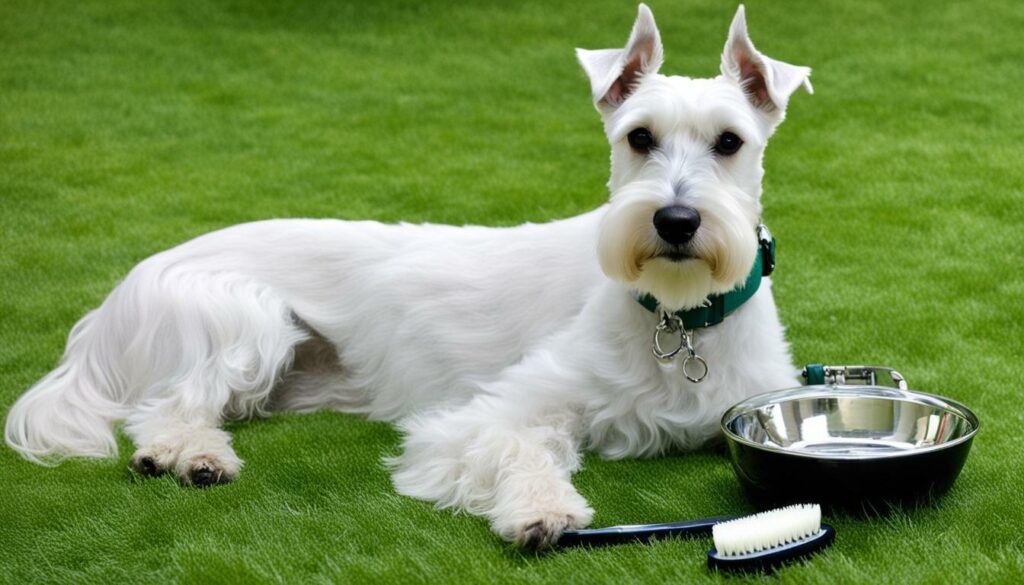
Miniature Schnauzers are prone to dental problems, so it’s essential to maintain good oral hygiene. Brush your Miniature Schnauzer’s teeth at least two to three times a week to prevent periodontal disease. You can also offer dental chews and toys to help clean their teeth and freshen their breath.
Vaccination Schedules
Regular vaccinations are crucial for keeping your Miniature Schnauzer healthy. Consult with your veterinarian to determine the appropriate vaccination schedule for your pet. Your Miniature Schnauzer will typically require a series of vaccinations during their first few months of life, followed by booster shots throughout their adult life.
General Tips
Aside from regular grooming, dental care, and vaccinations, there are other general care tips that can help keep your Miniature Schnauzer healthy. Be sure to provide them with a healthy diet and plenty of exercise to maintain a healthy weight and prevent obesity. Keep your Miniature Schnauzer’s living area clean and free of hazards to prevent accidents. Additionally, regular wellness check-ups with your veterinarian can help detect any potential health problems early on.
By following these Miniature Schnauzer care tips, you can ensure that your furry friend remains happy and healthy for years to come.
Miniature Schnauzer Training Techniques
Training your Miniature Schnauzer is crucial for their behavior and socialization skills. With proper training techniques, your Miniature Schnauzer can learn obedience commands and house manners, making your life easier and their life happier.
Basic obedience commands: Teaching your Miniature Schnauzer basic obedience commands is an essential part of their training. Commands like “sit,” “stay,” “come,” and “heel” can be taught using positive reinforcement techniques. Use treats and verbal praise to reward your dog when they perform the desired behavior.
House training: House training your Miniature Schnauzer takes patience and consistency. Establish a routine for feeding, bathroom breaks, and playtime, and always praise your dog when they eliminate in the designated area. Be sure to immediately clean up any accidents using a pet-specific odor-neutralizing cleaner to avoid your dog returning to that spot.
Leash manners: Your Miniature Schnauzer should learn proper leash manners to ensure a safe and pleasant walking experience for both you and your dog. Use a short leash and walk at a steady pace to establish control. When your Miniature Schnauzer pulls or attempts to lead, stop walking and wait for them to return to your side before continuing.
Consistency, patience, and positive reinforcement are key elements of effective Miniature Schnauzer training. With proper training, your Miniature Schnauzer can become a well-behaved and happy member of your family.
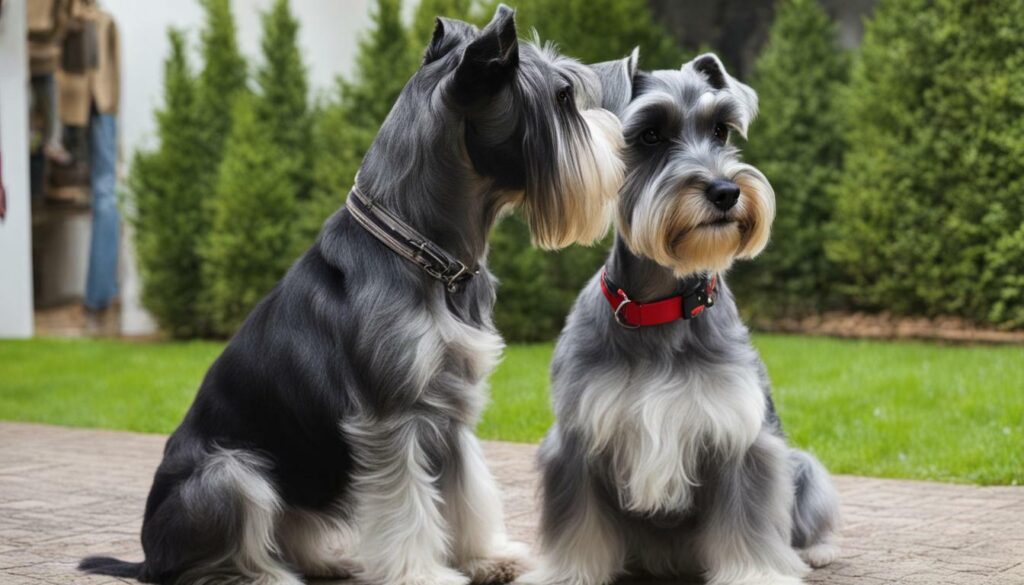
Keeping your Miniature Schnauzer healthy is a top priority for any responsible pet owner. Here are some essential health advice and tips:
Common Health Issues
Like all dogs, Miniature Schnauzers are susceptible to certain health issues. These may include:
- Bladder stones
- Eye problems
- Obesity
- Joint problems
- Diabetes
- Cancer
It’s essential to keep an eye out for any signs of illness or discomfort in your Miniature Schnauzer. Early detection and treatment can help prevent more serious problems down the line.
Preventive Care
Regular veterinary checkups are crucial to maintaining your Miniature Schnauzer’s health. Your vet can help you develop a preventive care plan, including vaccinations, dental care, and parasite prevention.
Additionally, keeping your Miniature Schnauzer at a healthy weight can help prevent a variety of health issues. Make sure to provide them with a balanced, nutritious diet and plenty of exercise.
Signs of Illness
It’s important to be able to recognize signs of illness in your Miniature Schnauzer. Some common symptoms include:
- Lack of appetite
- Difficulty breathing
- Lethargy
- Vomiting or diarrhea
- Coughing
- Changes in behavior
If you notice any of these symptoms or any other concerning changes in your Miniature Schnauzer’s health, contact your vet right away.

By following these health advice and tips, you can help ensure your Miniature Schnauzer lives a happy and healthy life. Regular preventive care and early detection of any health issues are key to keeping your beloved pet in top shape.
Miniature Schnauzer Grooming Tips
Grooming your Miniature Schnauzer is an essential aspect of their care. Proper grooming not only keeps your pet looking great but also helps maintain their overall health and well-being. Follow these tips to keep your Miniature Schnauzer’s coat and skin healthy:
Brush Regularly
Miniature Schnauzers have a thick, wiry coat that requires regular brushing. Brushing helps remove dead hair and prevents matting and tangling. Use a slicker brush and a comb to work through the coat. A pin brush can also be used to help remove loose hair.
Bathe Your Miniature Schnauzer
Regular bathing helps keep your Miniature Schnauzer clean and smelling fresh. Use a dog-specific shampoo and conditioner, and make sure to rinse thoroughly to prevent skin irritation. Bathing your Miniature Schnauzer every three months is sufficient, but you can bathe your pet more often if they have a skin condition or if they get very dirty.
Trim Nails
Trim your Miniature Schnauzer’s nails regularly to prevent overgrowth, which can cause discomfort and difficulty walking. Use a dog-specific nail trimmer and take care not to cut the quick, which is the pinkish part of the nail that contains blood vessels and nerves. If you’re unsure how to trim your pet’s nails, ask your veterinarian or a professional groomer for guidance.
Clean Ears
Keep your Miniature Schnauzer’s ears clean to prevent infections. Use a dog-specific ear cleaner and a cotton ball or pad to gently wipe the inside of the ear flap and the ear canal. Do not use cotton swabs, as they can cause injury. Check your pet’s ears regularly for signs of redness, swelling, or discharge.
Get Professional Grooming
Consider taking your Miniature Schnauzer to a professional groomer for a trim every few months. A groomer can help keep your pet’s coat in top condition and can also trim the hair around the ears and paws to prevent matting. Additionally, a groomer can check your pet’s skin and coat for any signs of issues such as hot spots, rashes, or parasites.
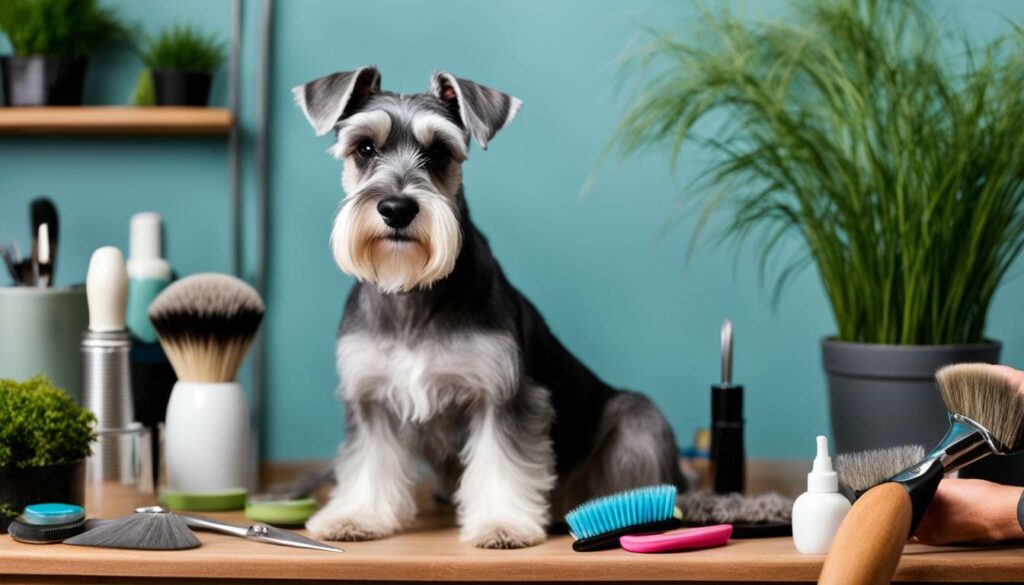
When it comes to bringing a Miniature Schnauzer into your family, choosing a reputable breeder is crucial. A responsible breeder will ensure the health and well-being of their puppies, as well as provide valuable information and support to new owners.
So, how do you choose a Miniature Schnauzer breeder?
| Tip | Description |
|---|---|
| Research | Do your research and find breeders with a good reputation. You can search online, speak to other Miniature Schnauzer owners, or contact Miniature Schnauzer clubs and associations for recommendations. |
| Visit the Breeder | Arrange to visit the breeder in person. A good breeder should be happy to show you around, introduce you to their dogs, and allow you to spend time with the puppies. Look for a clean and well-maintained environment with happy and healthy dogs. |
| Ask Questions | Ask the breeder plenty of questions, including information about the puppies’ parents, the breeding process, and any health issues within the breeder’s line. A good breeder will be knowledgeable and transparent, and happy to answer any questions you may have. |
| Health Clearances | Ensure that the breeder has conducted health clearances on their dogs, including screening for common genetic health issues found in the Miniature Schnauzer breed. These clearances should be available for you to view. |
| Contracts and Guarantees | Ask to see the breeder’s contracts and guarantees, which should cover the purchase price, health guarantees, and any return policies. Make sure that you understand and agree with the terms before making a commitment. |
By following these tips, you can find a reputable Miniature Schnauzer breeder who will provide you with a healthy and happy puppy, as well as valuable support and information throughout your Miniature Schnauzer’s life.
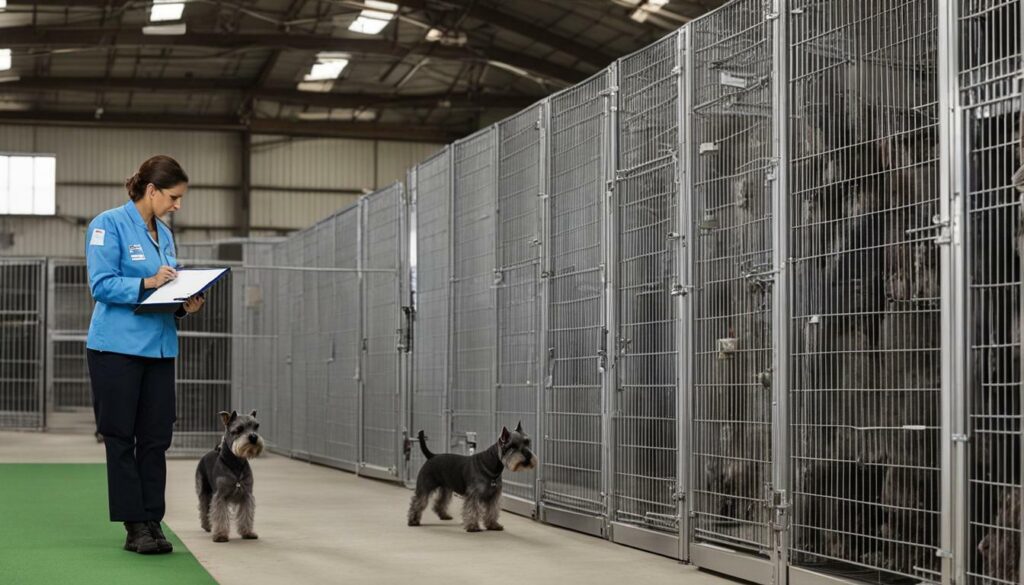
Feeding your Miniature Schnauzer a nutritious and balanced diet is crucial for their overall health and well-being. Here are some feeding guidelines to follow:
Choose a High-Quality Dog Food
When selecting a dog food, it’s important to choose a high-quality brand that uses real meat as the primary ingredient. Avoid dog foods that contain fillers, by-products, or artificial preservatives. It’s also beneficial to select a dog food formulated for small breeds, as their kibble size and nutrient requirements differ from larger dogs.
Portion Sizes
The amount of food your Miniature Schnauzer needs depends on their age, weight, and activity level. As a general rule, adult Miniature Schnauzers need ½ to 1 cup of food per day, split into two meals. Puppies and nursing mothers require more frequent feedings and larger portions.
Feeding Schedule
Stick to a regular feeding schedule by offering meals at the same time each day. This will help regulate your Miniature Schnauzer’s digestion and prevent overeating. Avoid free-feeding, where food is always available, as this can lead to obesity.
Snacks and Treats
While it’s okay to offer your Miniature Schnauzer small snacks or treats throughout the day, it’s important to ensure they don’t make up a significant portion of their diet. Treats should be given in moderation and used as a reward during training.
Water
Ensure your Miniature Schnauzer always has access to fresh, clean water. Change their water bowl frequently throughout the day to prevent bacteria growth and contamination.
By following these feeding guidelines, you can help ensure your Miniature Schnauzer maintains a healthy weight and receives the essential nutrients they need to thrive.
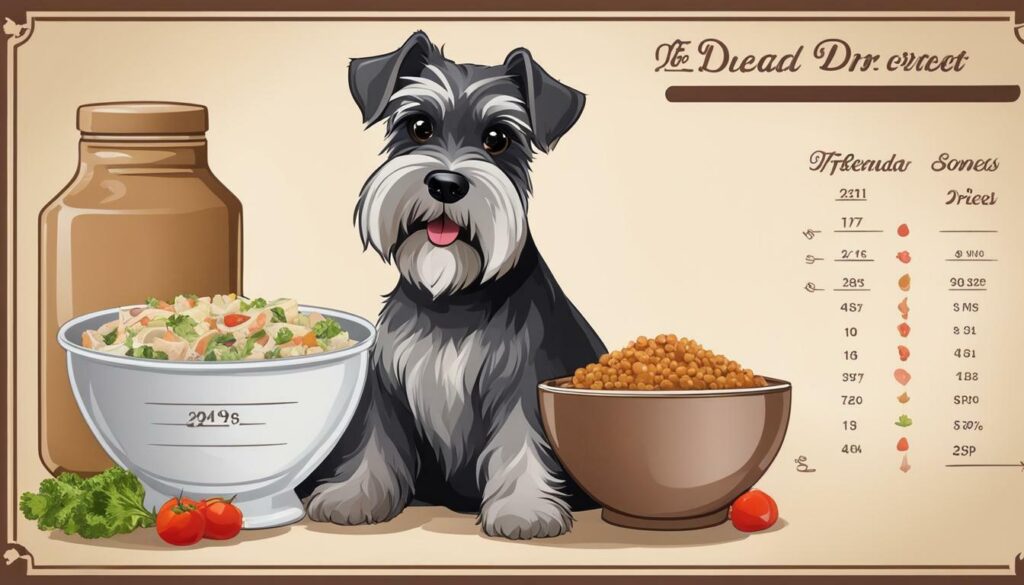
Just like humans, Miniature Schnauzers need regular exercise to maintain their physical and mental health. Lack of physical activity can lead to obesity, behavioral issues, and various health problems. It is essential to provide your Miniature Schnauzer with adequate exercise to keep them happy and healthy.
The recommended amount of exercise for a Miniature Schnauzer is around 30 to 60 minutes per day. However, this may vary based on their age, weight, and individual health needs. It is best to consult with your vet to determine the right amount of exercise for your Miniature Schnauzer.
There are various types of exercises that Miniature Schnauzers can engage in, including:
- Walking: Regular walks around the block or in a dog park can help your Miniature Schnauzer burn calories and socialize with other dogs.
- Running: Miniature Schnauzers love to run and play fetch. Engage in interactive games with your pet to provide them with the necessary exercise.
- Swimming: Swimming is a great low-impact exercise for Miniature Schnauzers, especially for dogs with joint problems or arthritis.
You can also incorporate daily activities that require physical movement, such as playing with toys or climbing stairs, to increase your Miniature Schnauzer’s activity level.
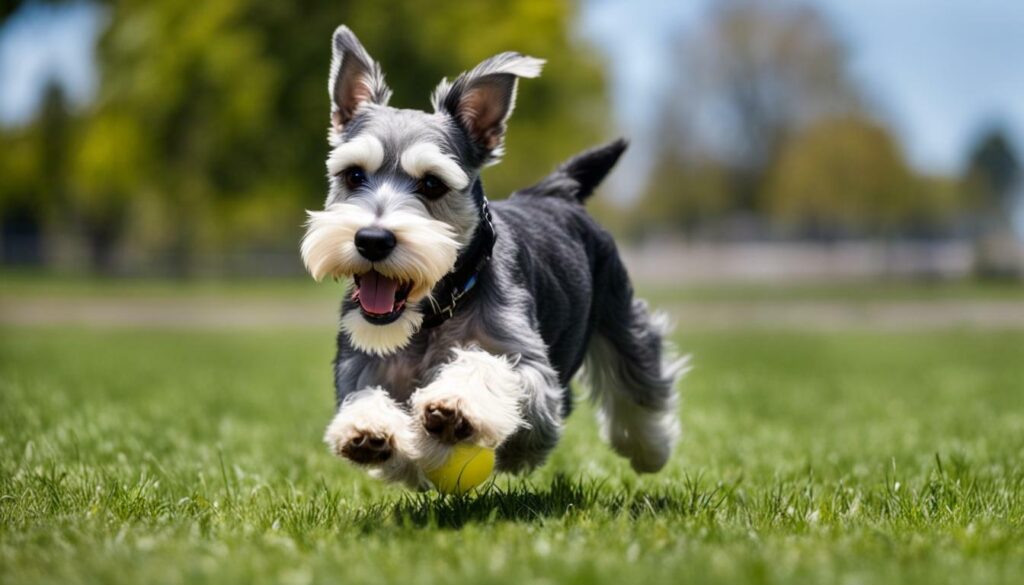
Remember to start slow and gradually increase the intensity and duration of exercise to avoid injury. Also, be mindful of the weather, as extreme temperatures can impact your Miniature Schnauzer’s ability to exercise.
Regular exercise is essential for the well-being of your Miniature Schnauzer. It not only helps them maintain a healthy weight but also keeps them mentally stimulated and happy. Incorporate physical activity into your Miniature Schnauzer’s daily routine, and you will have a healthier and happier pet.
Miniature Schnauzer Behavior Correction and Socialization Tips
Miniature Schnauzers are intelligent and lively dogs that require proper behavior training and socialization. Without proper training, they may exhibit undesirable behavior that can make it challenging to keep them as pets. Here are some tips on how to correct behavior issues and socialize your Miniature Schnauzer:
Behavior Correction
1. Identify the Root Cause: Before correcting behavior, it is essential to identify the cause. Common behavioral issues in Miniature Schnauzers include barking, chewing, digging, and jumping on people. Each of these behaviors has a specific trigger, which you must identify to address the issue.
2. Positive Reinforcement: Use positive reinforcement to correct behavior. Reward your Miniature Schnauzer when they exhibit good behavior, such as sitting or staying at command. Positive reinforcement will encourage good behavior and make the training experience more enjoyable for your pet.
3. Consistency: Consistency is key to correcting behavior issues in Miniature Schnauzers. Ensure you train your pet regularly and that everyone in your household follows the same training techniques. A lack of consistency can confuse your pet and make it challenging to correct behavior issues.
4. Seek Professional Help: If you’re struggling to correct your pet’s behavior, seek professional help from a certified dog trainer. They will help you with techniques to address specific behavioral issues and create a training plan tailored to your pet’s needs.
Socialization Tips
1. Early Socialization: Miniature Schnauzers require early socialization to prevent them from becoming aggressive or anxious around strangers and other pets. Introduce your pet to different people and pets from an early age to help them develop social skills and become comfortable in different situations.
2. Positive Reinforcement: Use positive reinforcement techniques to socialize your Miniature Schnauzer. Reward your pet with treats and praise when they exhibit good behavior, such as playing nicely with other pets or meeting new people without showing aggression.
3. Gradual Exposure: Gradually expose your pet to different social situations. Start with low-stress situations and gradually increase the level of exposure. This will help your pet feel more comfortable and less anxious in new environments.
4. Patience: Socializing your Miniature Schnauzer requires patience and time. Don’t rush the process, and be patient with your pet. Every dog is different, and some may require more time than others to become comfortable in social situations.
By following these behavior correction and socialization tips, you can ensure that your Miniature Schnauzer is well-behaved and comfortable in different social situations. Remember that every dog is unique, and it may take time to address specific behavior issues. With patience and consistency, your Miniature Schnauzer can become a well-socialized and well-behaved pet.
FAQ
What will I learn from the Miniature Schnauzer Ownership Guide?
In this comprehensive guide, you will learn everything you need to know to become a responsible and knowledgeable owner of a Miniature Schnauzer. From care and training to diet and health, we cover all the essential information to ensure a happy and healthy pet.
What are some care tips for Miniature Schnauzers?
Proper care is essential for the well-being of your Miniature Schnauzer. We will discuss grooming, dental care, vaccination schedules, and general tips on how to keep your Miniature Schnauzer clean and healthy.
What training techniques are effective for Miniature Schnauzers?
Training your Miniature Schnauzer is important for their overall behavior and socialization. We will delve into effective training techniques, including basic obedience commands, house training, and leash manners.
How can I maintain the health of my Miniature Schnauzer?
Maintaining the health of your Miniature Schnauzer is crucial for their happiness and longevity. We will discuss common health issues, preventive care, and how to recognize signs of illness in your Miniature Schnauzer.
What are some grooming tips for Miniature Schnauzers?
Regular grooming is necessary to keep your Miniature Schnauzer looking their best. We will provide you with grooming techniques, including bathing, brushing, and nail trimming, to keep your Miniature Schnauzer’s coat and skin healthy.
How do I choose a reputable Miniature Schnauzer breeder?
Selecting a reputable breeder is a crucial step in bringing a Miniature Schnauzer into your family. This section will guide you through the process, providing tips on how to find a responsible breeder and what questions to ask before making a decision.
What are the feeding guidelines for Miniature Schnauzers?
Proper nutrition is vital for the overall well-being of your Miniature Schnauzer. Here, we will discuss feeding guidelines, including the best type of diet, portion sizes, and feeding schedules to ensure your Miniature Schnauzer maintains a healthy weight.
How much exercise do Miniature Schnauzers need?
Regular exercise is essential for the physical and mental health of your Miniature Schnauzer. In this section, we will provide exercise recommendations, including suitable activities and the recommended amount of exercise for your Miniature Schnauzer.
How can I correct behavior issues and socialize my Miniature Schnauzer?
Proper behavior and socialization are essential for a well-adjusted Miniature Schnauzer. Here, we will provide tips on how to address common behavioral issues and how to socialize your Miniature Schnauzer with other pets and people.
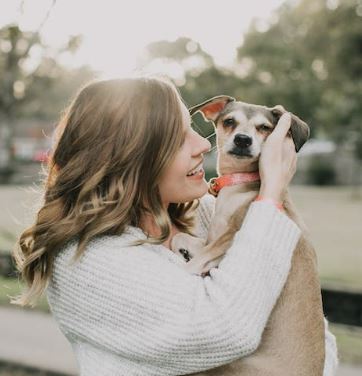
Marissa Delotta, 36, from Dayton, Ohio, is the creative force behind Roverboard.com, a beloved online destination for dog lovers. As a dedicated mom and canine enthusiast, Marissa combines her family experiences with her love for dogs to offer a platform where dog owners can exchange tips, heartwarming stories, and advice. Her website has become a vibrant community for sharing the joys of dog parenting. In her free time, Marissa enjoys exploring dog parks with her family and volunteering at local animal shelters.
